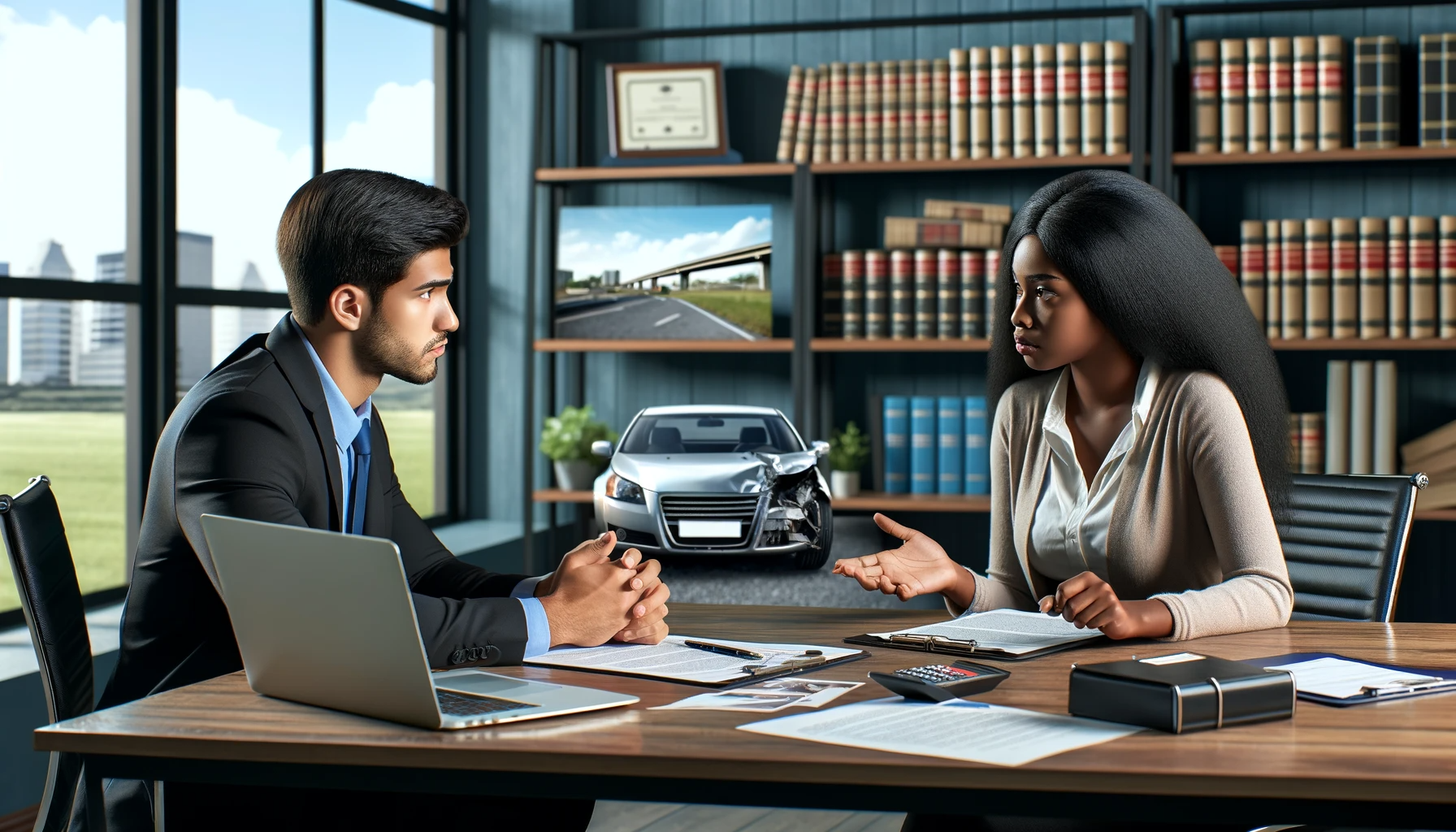Introduction
Mediation might sound like a complicated legal process, but it’s actually one of the simplest and most effective ways to resolve disputes after a
car accident. Whether you're dealing with disagreements over fault, damages, or insurance claims, mediation offers a practical alternative to the courtroom drama. Its popularity is on the rise for good reason—it empowers individuals to take control of their disputes while saving time, money, and emotional energy. If you’ve ever wondered how mediation works and why it’s becoming the go-to method for conflict resolution, you’re in the right place. Let’s dive into the world of mediation and uncover its mechanics in car accident cases.

Mediation is a structured yet informal process in which a neutral third party, known as the mediator, helps disputing parties communicate and negotiate to reach a mutually acceptable resolution. Unlike traditional litigation, mediation isn’t about determining who’s right or wrong; it’s about finding a solution that works for everyone involved.
This process is voluntary in most cases, meaning both parties must agree to participate. It’s also highly adaptable, catering to the unique needs and circumstances of each case. Mediation is especially beneficial in car accident disputes, where emotions can run high and relationships between parties—such as neighbors or colleagues—might need to be preserved.
Why Mediation is Important for Resolving Car Accident Disputes
Car accidents often result in complex disputes over a variety of issues, including property damage, medical expenses, lost wages, and insurance settlements. Traditional litigation can exacerbate these conflicts, leading to prolonged stress, high costs, and adversarial relationships. Mediation, on the other hand, offers a way to resolve these issues quickly and amicably.
- Efficiency: Mediation sessions are typically much shorter than court trials, often concluding in a matter of days or weeks.
- Cost-Effectiveness: With fewer legal fees and court costs, mediation is a budget-friendly option for many people.
- Privacy: Unlike court proceedings, which are part of the public record, mediation sessions are confidential, allowing parties to discuss sensitive matters openly.
- Control: Both parties maintain greater control over the outcome, as opposed to having a judge or jury decide their fate.
- Preservation of Relationships: Mediation fosters cooperation and communication, which is particularly valuable if the parties need to interact in the future.
Understanding the Basics of Mediation
A Non-Adversarial Approach to Conflict Resolution
Mediation flips the script on traditional conflict resolution. Instead of pitting two sides against each other, it encourages collaboration. The focus is on dialogue and mutual understanding, creating an environment where all parties feel heard and respected. The ultimate goal is not to assign blame or declare a winner but to craft a solution that satisfies everyone involved.
This approach is especially effective in
car accident cases, where emotions such as anger, frustration, or fear can hinder constructive discussions. A skilled mediator helps diffuse tension, keeping conversations productive and focused on problem-solving.
Differences Between Mediation and Court Litigation
| Aspect |
Mediation |
Court Litigation |
| Nature |
Collaborative and flexible |
Adversarial and rigid |
| Privacy |
Confidential |
Public record |
| Control |
Parties decide the outcome |
Judge or jury decides the outcome |
| Cost |
Generally lower |
Often expensive |
| Time |
Shorter process |
Can take months or years |
In essence, mediation prioritizes efficiency and cooperation, making it an appealing option for
car accident cases.
Key Parties Involved in Mediation
The Role of the Mediator
The mediator plays a central role in the process, acting as an impartial facilitator. They don’t make decisions for the parties or take sides. Instead, they:
- Guide Discussions: Ensure that conversations stay on track and focus on resolving the dispute.
- Clarify Issues: Help each party understand the other’s perspective and the key points of contention.
- Encourage Compromise: Suggest creative solutions and alternatives to bridge the gap between the parties.
- Maintain Neutrality: Create a safe and respectful environment for dialogue.
A skilled mediator possesses strong communication and conflict-resolution skills, as well as an understanding of the legal and practical issues surrounding
car accidents.
Responsibilities of Each Party
For mediation to succeed, the parties involved—the plaintiff and the defendant—must approach the process with a cooperative mindset. Their responsibilities include:
- Preparing Thoroughly: This involves gathering all relevant documents, such as police reports, medical bills, repair estimates, and insurance correspondence.
- Communicating Openly: Honest and transparent dialogue is critical. Parties should express their concerns, priorities, and desired outcomes clearly.
- Negotiating in Good Faith: Both sides must be willing to compromise and consider the other’s perspective to achieve a mutually beneficial resolution.
- Listening Actively: Understanding the other party’s viewpoint can often reveal common ground and pave the way for agreement.
Mediation is a structured yet flexible process designed to resolve disputes effectively and amicably. In
car accident cases, this process can help both parties address their issues without the need for drawn-out court battles. Below is a detailed breakdown of how the mediation process works, along with its strategies, benefits, and challenges.
Step-by-Step Guide to Mediation
- Initial Consultation and Agreement to Mediate
The process begins with both parties agreeing to resolve their dispute through mediation. This decision is often prompted by legal counsel or mutual recognition of the benefits mediation offers over litigation. Once agreed, the parties outline the scope of the mediation and the key issues to be addressed, such as fault, damages, medical expenses, and insurance claims.
- Mediator Selection
Selecting the right mediator is a critical step. A mediator experienced in car accident cases will have the legal and practical knowledge needed to navigate the complexities of the dispute. They should also possess strong interpersonal and negotiation skills to foster productive discussions. The mediator must be acceptable to both parties to ensure trust and impartiality.
- Confidentiality Agreements
All participants sign confidentiality agreements to ensure that the discussions remain private. This means that statements made during mediation cannot be used in court if the case doesn’t resolve. This confidentiality encourages openness and honesty, allowing parties to communicate without fear of legal repercussions.
- Opening Statements
Each party has the opportunity to present their perspective on the case, outlining their concerns, goals, and desired outcomes. The mediator ensures these statements remain respectful and focused on the issues at hand.
- Joint Discussions and Private Sessions
The mediator facilitates joint discussions to identify areas of agreement and clarify disagreements. If tensions run high, the mediator may hold private sessions (caucuses) with each party to explore potential compromises in a less confrontational setting.
- Negotiation and Agreement Drafting
As the parties work toward a resolution, the mediator helps draft an agreement that reflects the terms both parties accept. This agreement may address compensation, timelines for payment, and other relevant conditions. Once finalized, the agreement becomes a binding contract.
Negotiation Techniques in Mediation
- Building Common Ground
Establishing shared goals and areas of agreement early on helps reduce tension and fosters a collaborative atmosphere. For example, both parties might agree that resolving the case quickly and fairly is in their best interest. Recognizing these commonalities makes it easier to address points of contention.
- Strategies for Effective Communication
- Active Listening: Each party is encouraged to truly hear the other side’s perspective without interrupting or judging. This can defuse emotions and create mutual understanding.
- Clear Articulation of Needs: Participants should communicate their concerns and expectations clearly. Ambiguity can lead to misunderstandings and stalled discussions.
- Focus on Solutions: Instead of dwelling on past grievances, mediation emphasizes moving forward by identifying practical, achievable resolutions.
Advantages of Mediation Over Litigation
- Why Mediation is Faster and Less Expensive
Litigation can take months or even years to resolve, involving multiple court dates, extensive legal fees, and procedural delays. In contrast, mediation often concludes in weeks or a few sessions, saving both time and money. With fewer formalities and lower attorney fees, mediation is particularly appealing for individuals seeking cost-effective dispute resolution.
- The Emotional Benefits of Mediation
Litigation can be emotionally taxing, with adversarial proceedings exacerbating stress and anxiety. Mediation’s cooperative approach provides a more supportive environment. Parties have the opportunity to express their feelings and concerns in a safe space, fostering emotional closure and reducing the strain associated with prolonged conflict.
Challenges in Mediation
- Common Pitfalls in Mediation
Despite its benefits, mediation isn’t without challenges. Some common issues include:
- Resistance to Compromise: One or both parties may refuse to budge from their initial positions, hindering progress.
- Lack of Preparation: Entering mediation without the necessary documentation, such as medical bills or accident reports, can stall negotiations.
- High Emotions: Anger or resentment can make productive discussions difficult, especially in cases where one party feels wronged.
- How to Overcome Mediation Challenges
- Clear Communication: Encouraging open, honest, and respectful dialogue can break down barriers and foster understanding.
- Realistic Expectations: Both parties should understand that mediation is about compromise, not winning. Setting achievable goals is crucial.
- Thorough Preparation: Bringing all relevant information and being ready to discuss the details of the case ensures a smoother process.
- Mediation Coaching: Some parties may benefit from pre-mediation coaching to help them articulate their concerns and approach negotiations constructively.
Legal and Financial Aspects of Mediation
When it comes to
car accident disputes, mediation not only simplifies the resolution process but also provides a clearer, often more amicable, path to settlement. Understanding the legal and financial elements involved is crucial for ensuring a smooth and successful mediation experience.
Understanding Settlement Agreements
Settlement agreements are the cornerstone of mediation, formalizing the resolution reached by the parties. These agreements can vary based on the case and the needs of the parties involved:
- Binding Agreements: In most cases, the settlement reached during mediation is legally binding, meaning both parties are obligated to adhere to its terms. This provides a sense of closure and eliminates the need for further legal action.
- Non-Binding Agreements: In some instances, especially during preliminary mediations, the agreements may be non-binding. These serve as a framework for continued negotiations but do not impose legal obligations unless both parties later formalize the terms.
- Key Components: A comprehensive settlement agreement typically includes:
- Details of compensation, such as payments for medical bills, property repairs, or lost wages.
- Timelines for fulfilling the agreed terms.
- Any conditions or contingencies that may apply.
- A confidentiality clause to ensure privacy.
Thoroughly reviewing and understanding the settlement agreement before signing is essential. Consulting an attorney can help clarify any legal language and ensure your rights are protected.

Costs Involved in Mediation
While mediation is often less expensive than litigation, there are still costs to consider. Understanding these expenses can help you plan your budget:
- Mediator’s Fees: Mediators typically charge by the hour, with rates depending on their experience, expertise, and location. For car accident cases, rates might range from $100 to $400 per hour or more.
- Administrative Costs: Some mediators or mediation centers charge additional fees for scheduling, document review, or providing facilities for the mediation session.
- Attorney Fees: If you choose to involve an attorney in the mediation process, their fees may be added to the overall cost. However, having legal representation can be invaluable for ensuring a fair agreement.
- Case Complexity: Complex cases involving multiple parties, extensive damages, or intricate legal issues may require longer mediation sessions, increasing costs.
Despite these expenses, mediation remains significantly more affordable than litigation, which can involve court fees, prolonged attorney representation, and other related costs.
Tips for a Successful Mediation
Success in mediation often depends on preparation and effective communication. By taking the right steps, you can increase the likelihood of reaching a favorable resolution.
Preparing for Mediation
Preparation is key to presenting a strong case during mediation. Steps to ensure you’re ready include:
- Gather Evidence:
- Compile all relevant documents, including police reports, medical records, repair estimates, and insurance correspondence.
- Organize these materials to present a clear and convincing narrative of your claim.
- Understand Your Goals:
- Define your priorities before the session. What outcomes are you willing to accept? Knowing your limits can guide your negotiation strategy.
- Know the Other Party’s Position:
- Anticipate the other party’s arguments and prepare responses backed by evidence.
- Consult an Attorney (if needed):
- Legal advice can help you navigate complex issues and understand the implications of potential settlements.
Communication Tips for Mediation
Effective communication fosters cooperation and helps avoid unnecessary conflicts. Here are some strategies:
- Stay Calm:
- Approach the mediation with a composed and professional demeanor. Emotional outbursts can derail the process and harm your credibility.
- Listen Actively:
- Pay close attention to the other party’s concerns. Understanding their perspective can reveal areas of compromise and common ground.
- Articulate Clearly:
- Express your needs and expectations concisely. Avoid vague statements or demands that may confuse the discussion.
- Avoid Blame and Accusations:
- Focus on solutions rather than assigning fault. A collaborative mindset can lead to better outcomes for both parties.
Conclusion
Mediation is a powerful tool for resolving
car accident disputes, offering a faster, more cost-effective, and less adversarial alternative to litigation. By fostering collaboration and maintaining confidentiality, it allows parties to work toward mutually beneficial solutions in a supportive environment.
Success in mediation begins with preparation—gathering evidence, defining goals, and approaching the process with an open mind. Effective communication further ensures productive discussions, helping both parties achieve a fair resolution.
Ultimately, mediation not only resolves disputes but also helps preserve relationships, reduce stress, and provide closure. By understanding its legal and financial aspects, as well as implementing strategies for success, you can navigate mediation with confidence and achieve a satisfactory outcome.
Look for an attorney who has the right legal resources for your legal needs.
Contact us here on the
Warmuth Law website or through our hotline 888-517-9888.
Frequently Asked Questions (FAQ's)
1. What is the role of the mediator in a car accident mediation?
The mediator facilitates discussions, helps clarify issues, and guides the parties toward a mutually agreeable resolution.
2. How long does mediation usually take for car accident cases?
Most mediations are resolved within a day or two, but complex cases might take longer.
3. What happens if mediation fails?
If mediation fails, parties can still pursue litigation or explore other dispute resolution methods.
4. Are mediation agreements legally binding?
Yes, if both parties agree and sign the settlement, it can be legally binding.
5. Can I bring an attorney to mediation?
Absolutely. An attorney can provide valuable advice and ensure your rights are protected during the process.













